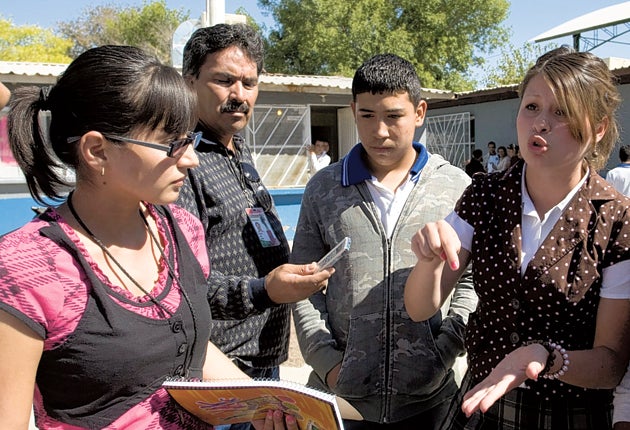Student handed task of tackling Mexico's brutal drug barons

Your support helps us to tell the story
From reproductive rights to climate change to Big Tech, The Independent is on the ground when the story is developing. Whether it's investigating the financials of Elon Musk's pro-Trump PAC or producing our latest documentary, 'The A Word', which shines a light on the American women fighting for reproductive rights, we know how important it is to parse out the facts from the messaging.
At such a critical moment in US history, we need reporters on the ground. Your donation allows us to keep sending journalists to speak to both sides of the story.
The Independent is trusted by Americans across the entire political spectrum. And unlike many other quality news outlets, we choose not to lock Americans out of our reporting and analysis with paywalls. We believe quality journalism should be available to everyone, paid for by those who can afford it.
Your support makes all the difference.When Marisol Valles applied to study criminology at college in Ciudad Juarez, next to the Texas border in Mexico, she probably expected that her country's war against the drug lords would come into the curriculum. What she didn't expect, surely, was to become a commander in the fight to tame them.
At just 20 years old, Ms Valles has found herself in the unlikely position of the newly appointed police chief of the nearby town of Praxedis G Guerrero, which, like Ciudad Juarez itself, is in the middle of the drugs corridor into the United States, which two drug cartels are battling to control.
While an estimated 29,000 people have died across Mexico since President Felipe Calderon declared war on the drugs cartels four years ago, most of the violence has been in Ms Valles's state of Chihuahua. About 7,000 people have lost their lives in and around Ciudad Juarez since 2008.
That her new job comes with such peril makes the appointment all the more surprising. While some in Mexico see it as an uplifting move in a war that has brought only misery, others consider it a fresh sign of desperation. "Are there no men in Chihuahua?" asked a headline in the Periodista Digital blog.
The first responsibility of Ms Valles is to protect the roughly 8,000 residents of her town. However, her police department will also be keeping the peace, or attempting to, in nearby El Porvenier, which lost its top official and his son, gunned down just this past weekend. Cartel thugs have recently ransacked shops and torched businesses in El Porvenir. In June, another nearby community, Guadalupe Distrito Bravos, lost its mayor to cartel killers.
Ms Valles does not have a lot of hardware at her disposal. She can count just one marked police cruiser, three automatic rifles and one pistol. Of the 13 officers on her force, nine are women.
"The weapons we have are principles and values, which are the best weapons for prevention," Ms Valles, who aims to continue at the same time with her criminology studies and also look after her infant son, said. "Our work will be pure prevention. We are not going to be doing anything else other than prevention."
The level of bloodshed has escalated in northern Chihuahua as one local cartel boss, Vicente Carrillo Fuentes has sought to protect his lucrative drug smuggling territory from an offensive by Mexico's most wanted drug lord, Joaquin "Shorty" Guzman.
President Calderon has already drafted the military into the area, in part as a response to deeply ingrained corruption in some police forces where officers are frequently bought by the much better funded cartels.
He is also trying to persuade Congress in Mexico City to pass a law that would put all municipal police departments under state control.
"The situation can improve if we believe in ourselves and believe there is hope. I want to carry this through and show that we can do this," Ms Valles told reporters after her appointment by the mayor of Praxedis G Geurrero was made public.
"We are doing this for a new generation of people who don't want to be afraid any more."
She said she plans to encourage neighbourhood watch committees by talking to women in households in the town and to establish programmes in local schools to foster security.
"We are simply going to talk with them, with the people, with the families, giving them confidence so they will quit being afraid, so they can leave their houses," she said.
But she also signalled a degree of realism. "Yes, there is fear. It's like all human beings. There will always be fear, but what we want to achieve in our municipality is tranquillity and security."
Join our commenting forum
Join thought-provoking conversations, follow other Independent readers and see their replies
Comments